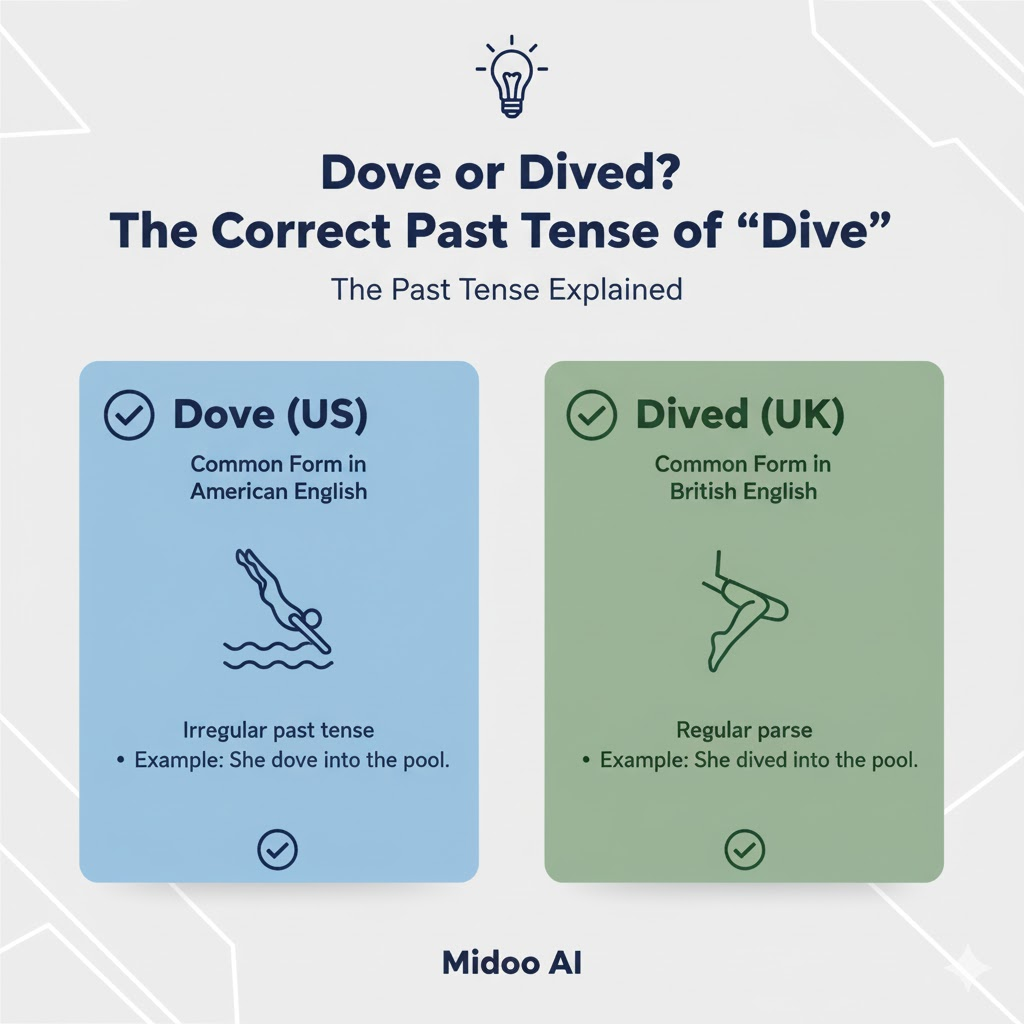Dove or Dived — Which Past Tense of “Dive” Is Correct?

Even confident English learners pause when deciding whether to say “dove” or “dived.” The confusion is understandable—both are correct, but they’re used differently across English varieties. In this guide, Midoo AI, your intelligent language-learning companion, explains where each form comes from, how native speakers use them, and how you can confidently choose the right one depending on your context.
1. The Origins of “Dive” and Its Past Forms
The verb “dive” entered English in the Middle Ages, originally meaning “to plunge into water headfirst.”
Early English followed a simple rule: regular verbs ended with “-ed” in the past tense. So historically, the correct form was “dived.”
Example from 16th-century writing:
“The bird dived swiftly into the stream.”
But around the late 19th century, American English speakers began using “dove” by analogy with irregular verbs such as “drive → drove” and “ride → rode.” Over time, this new irregular form spread widely in the U.S. and became common in storytelling, journalism, and everyday speech.
2. American vs. British Usage
The main difference between “dove” and “dived” comes down to geography and style:
| Region | Preferred Form | Example Sentence |
|---|---|---|
| 🇺🇸 American English | dove | “He dove into the pool to save the child.” |
| 🇬🇧 British English | dived | “She dived into the sea during the storm.” |
However, the line isn’t absolute. Some British speakers now use “dove” in informal settings, while certain American writers still prefer “dived” in formal essays or academic writing.
Midoo AI’s adaptive grammar module actually accounts for this nuance: if you select “British English,” it highlights “dove” as nonstandard; if you’re learning “American English,” it marks “dived” as acceptable but slightly formal.
3. Context and Tone: When to Choose Each
Choosing between “dove” and “dived” isn’t just about grammar—it’s about tone.
- Use “dove” when you want a vivid, narrative, or dramatic effect.
“The hero dove into danger without hesitation.”
- Use “dived” when clarity and grammatical formality matter.
“The scientist dived beneath the surface to collect samples.”
In fiction, journalists often favor “dove” for rhythm and flow. In academic or international English, “dived” is the safer bet.
If you’re not sure which to use, Midoo AI’s writing assistant can detect your dialect and automatically adjust your sentence tone and verb forms in real time—so your writing stays both accurate and natural.
4. Common Collocations and Idioms
“Dive” appears in both literal and figurative expressions. Here’s how each past form works in real contexts:
| Expression | With “Dove” | With “Dived” |
|---|---|---|
| Literal | “He dove into the icy lake.” | “He dived into the icy lake.” |
| Figurative | “She dove into her studies.” | “She dived into her studies.” |
| Idiomatic | “Prices dove overnight.” (U.S.) | “Prices dived overnight.” (U.K.) |
In short, both forms are grammatically correct. The choice depends on whether you’re aiming for American expressiveness or British precision.
Example
He dove into the pool to grab the floating key before it sank.
OR
He dived into the pool to grab the floating key before it sank.
Both are right—just stay consistent within one text.
Tip from Midoo AI
If your goal is to sound more natural in American conversation, go with “dove.”
If you’re preparing for IELTS, TOEFL, or academic writing, “dived” is still slightly preferred.
💡 With Midoo AI, you can practice both versions interactively. It will analyze your pronunciation, grammar accuracy, and regional tone—helping you internalize the difference effortlessly.
FAQs
1. Is “dove” grammatically correct?
Yes. “Dove” is widely accepted in American English as the past tense of “dive.” Most dictionaries, including Merriam-Webster, recognize it as standard.
2. Which form should I use for exams like IELTS or TOEFL?
Use “dived.” International English assessments lean toward the traditional British form, which is more universally accepted.
3. Can I use “dove” and “dived” interchangeably in the same piece?
It’s best not to. Choose one form and stick with it to maintain consistency in tone and region.
4. What about “have dove” or “have dived”?
Both can appear, but “have dived” is more standard, even in American English. For example:
“She has dived there many times before.”
5. Why does Midoo AI correct one but not the other?
Because Midoo AI adapts to your chosen English variety. If you’re practicing U.S. English, it’ll mark “dove” as natural; if U.K. English, it’ll highlight “dived.”
In Summary
Both “dove” and “dived” are correct past forms of “dive.”
- “Dove” = American, vivid, informal.
- “Dived” = British, formal, academic.
No matter which you prefer, Midoo AI helps you master both forms contextually—so your English feels fluent, natural, and regionally accurate.